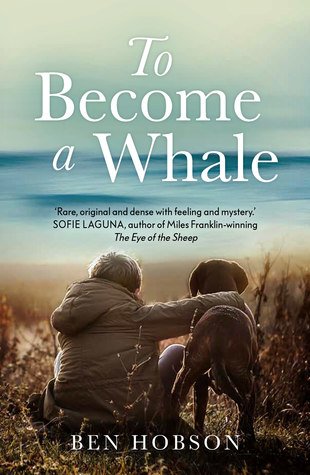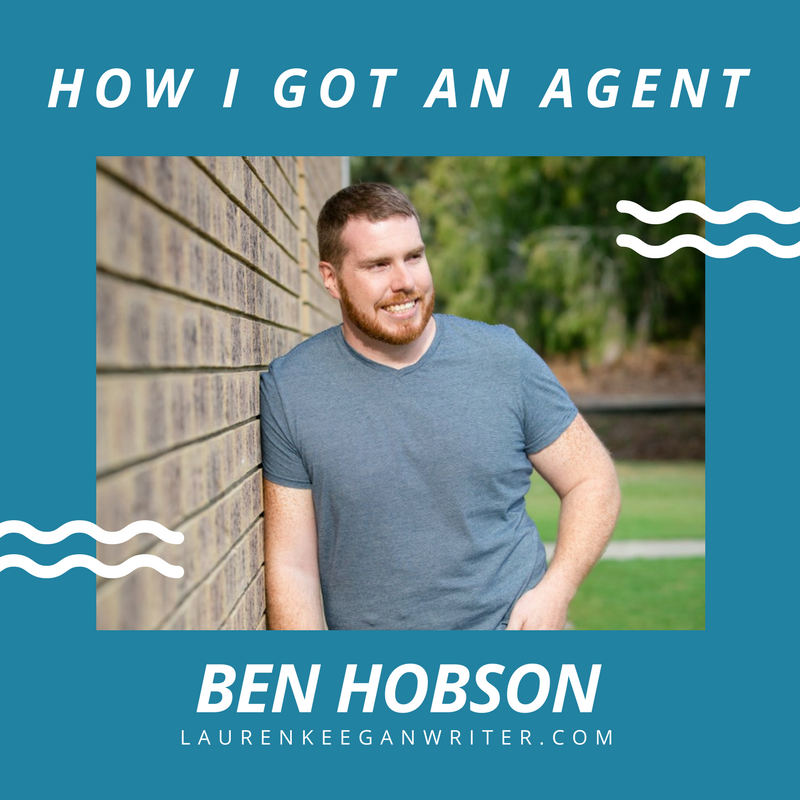Ben Hobson: How I Got An Agent
An interview with debut author Ben Hobson on how he got a literary agent and a publishing deal.
Welcome back to my monthly blog series.I’m all about getting a literary agent this year so I'm interviewing Australian authors to find out how they did it. If you missed the first two posts, then please check out my interviews with Vanessa Carnevale and Louise Allan.This month, the wonderful debut novelist Ben Hobson agreed to sit in the hot seat. I first discovered Ben when I heard him interviewed on the So You Want To Be A Writer podcast. He talked about the experience of rejection and the endless revisions of manuscripts, battling self-doubt and the importance of perseverance. All of this resonated with me as an aspiring fiction writer.Ben has very generously spilled the beans on how he got an agent and a book deal. Happy reading :-)
Q. First, tell us about the book that landed you a literary agent.
A. To Become a Whale was released in June 2017, and it was the book that landed me an agent. It took around six months to write, over a year to rewrite, and over another year to edit. It went through a lot of changes after my agent decided to represent it, too, which were invaluable before we sent it out. To Become a Whale is the fourth full length novel I’ve written. There’s a novella in my history as well.

Q. What steps did you take to refine the manuscript once you completed your first draft?
A. I found that, after so many years of butting my head up against publishing shut-doors, that I’d started to change my voice to suit some ephemeral, unknowable audience. I was trying to write how I thought people wanted me to, in contrast to my actual voice. So, after I’d finished my first draft, I went and saw Rohan Wilson speak (who also helped launch my book!). Rohan Wilson is an Australian author with an incredibly unique voice and when I heard him speak, I felt permission to write how I damn well pleased. That night I opened up my first draft, opened up a new document, and had them sit side by side on my laptop screen. I then rewrote the entire novel, from start to finish. I changed tense and I elevated every single description. I wouldn’t do it again, on account of the amount of work, but it was invaluable. It made the book what it is today.
Q. It's really drilled into us writers to develop our 'voice' and sometimes in trying to find our 'voice' we can lose touch with our natural writing style. I have struggled with this at times too.
How did you approach writing the synopsis and blurb?
A. This is a great question, and I’m almost embarrassed by the answer. I submitted my novel to the Vogel award. I did not win, but in my rejection letter, for the first time ever, I received a small amount of feedback. It talked about masculinity, questions, drama, blood; basically summing up all my intentions. It was immensely satisfying to see that they’d taken from the book what I’d intended!
Then I literally stole the entire thing - word for word – and used it as my synopsis.
Q Haha! I would love to have my synopsis written for me as I'm awful at 'selling' my story. Amazing that you received such in-depth feedback from your entry, and so helpful too.
What is your elevator pitch?
A. A devastatingly beautiful story of a gentle boy trying to make sense of the terrible reality of whaling, and the cruelty and alienation of his new world; the world of men.
Q. Love it! How did you get an offer of representation?
A. After I wasn’t fortunate enough to win the Vogel, I took one piece of advice that judges gave me, and revised the manuscript. Basically I went through the thing and heightened drama. After that, I found a list of agents from https://austlitagentsassoc.com/and highlighted four of them I thought sounded suitable. I also looked at the list of authors they currently had in their roster. Even though it was a bit naughty (don’t do this!) I sent out query letters to them all simultaneously. I know most suggest not to multi-submit, but at this point in my nine year writing career, I was done. This was the last gasp above water. And if I’d sunk at that point I may have never resurfaced.
Q. What did you do right?
A. In all honesty, I think I wrote a sellable book. There’s a lot to be said about presenting your manuscript in the best way possible – and all of that is warranted, and necessary. But honestly, in talking with my agent and others in the industry, time and time again it seems they are simply hungry to read good books. With all humility (which is traditionally how the non-humble start sentences) I think I wrote a good, sellable book.
Q. What would you have liked to have done differently?
A. In the years and years it took me to find an agent, what I regret is blaming the presentation of my manuscript for its failure to win responses. I should’ve been refining my process, and my manuscripts, but instead I was refining my pitch. I became an author before I became a writer, and I regret having it around the wrong way for so long.
Q. That's an interesting point, Ben. There's a lot of pressure on writers to have an author platform, an amazing hook and a great pitch, but the most important thing really, is a well-written story.
What has been surprising about the negotiation or publishing process?
A. This will sound terrible, but the most surprising thing about the negotiation process was how easy it was. I don’t mean that it was easy – I wrote for a long time before getting anywhere! – but that it felt as though one minute I was sitting alone, editing my manuscript for nobody to read, and the next minute I was receiving offers. It is utterly surreal. This thing that had been worthless for so long suddenly became worth something.
The part that surprised me the most about the publishing process was how slow, careful, and considered it was. I’m not sure what I expected, but there was so much editing, rewording, writing, planning, talking, cover changes, and so on. And every single step was delightful. I loved being edited. Writing into nothingness for nine years and suddenly I’m given concrete, concise points on how to improve? Yes please!
Q. As writers we are encouraged to build an author platform. You have a solid social media following and a wonderful blog. What did you consider when you were starting out?
A. Thank you, but I feel a bit lazy with my blog. I want to update more, and plan to soon. I’m no Louise Allan! But twitter is where my heart is, as far as author platforms go. I didn’t consider much when starting out. I knew, though, that it was important to get your name out there, so I just started involving myself in conversations on twitter with other authors. It is definitely something publishers consider. It was slow, long, and hard work, but I kept plugging away with it. Now I have so many wonderful people I know from twitter who work within the writing community. Authors are generally (at least I’ve found) incredibly kind, and helpful. Don’t be afraid to talk to them! They’re just humans too!
Q. What is your advice for writers who seek an agent?
A. Write the best damn book you can possibly write. Let it sit, come back to it, let it sit again. There’s no rush. Give it to friends. Give it to other writers. Work it, work it, work it. Don’t be afraid to scrap half of it. Only use rejection as fire for more refinement.
Q. Great tips! Finally, what’s next for you?
A. I have a few interesting things coming up I’m not at full liberty to divulge just yet – but something I’m very excited about is my YouTube channel. It’s called Unpolished, and it’s simply me, talking about writing. My aim is to give people a behind-the-scenes look at the publishing/writing process. So hopefully I’ll finish editing the first episode soon! I’m also doing a talk at Chermside library, in Queensland, and at Aireys Inlet for Great Escape Books in Victoria.
_Thank you so much for taking the time to answer my questions, Ben. It's reassuring to hear that hard work does pay off. I'll remember that when I undertake draft ten of a manuscript in coming months! I'm very intrigued to find out more about your YouTube channel so please keep us posted on this.To find out more about Ben, you can visit his website or connect with him on Twitter, Facebook, and Instagram.

